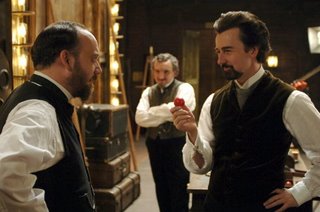 Story: Edward and Sophie, although a peasant and a duchess, manage to meet and fall in love. Finally tore apart, Edward disappears for more than a decade. He reappears in Vienna as Eisenheim the Illusionist (Edward Norton), just as it appears that Sophie (Jessica Biel) will marry Crown Prince Leopold (Rufus Sewell). Leopold becomes suspicious of Eisenheim and Sophie, and he orders Chief Inspector Uhl (Paul Giamatti) to find a reason to arrest the magician.
Story: Edward and Sophie, although a peasant and a duchess, manage to meet and fall in love. Finally tore apart, Edward disappears for more than a decade. He reappears in Vienna as Eisenheim the Illusionist (Edward Norton), just as it appears that Sophie (Jessica Biel) will marry Crown Prince Leopold (Rufus Sewell). Leopold becomes suspicious of Eisenheim and Sophie, and he orders Chief Inspector Uhl (Paul Giamatti) to find a reason to arrest the magician. After publishing my own review of The Prestige, I happily settled into reading others' reviews. Imagine my disappointment when I discovered that most critics, or at least the ones I have read so far, felt that The Prestige didn't stack up the year's earlier magic-centric movie, The Illusionist. I had put off seeing the latter until I could screen it for a little less at ye olde Bytowne, and the reviews had me baffled.
So what makes this movie any better than the other one? In a word? Nothing. It's not that writer-director Neil Burger's adaptation of Steven Millhauser's short story isn't good. It's plenty of good. It may even be very good.
It is, however, hollow. From the dialogue to the acting to the director, there's no emotion in any of it. We're kept at an arm's length, and, well, it's hard to love a picture that won't take you in.
Giamatti comes close to inviting us into what
 should be a passionate love story. Subverting his schluby, stuttering Everyman type, Giamatti displays a sweet confidence that is undercut with menace. It's pretty clear which side Uhl will line up with, but Giamatti makes sure that even Uhl is surprised by his choices and actions.
should be a passionate love story. Subverting his schluby, stuttering Everyman type, Giamatti displays a sweet confidence that is undercut with menace. It's pretty clear which side Uhl will line up with, but Giamatti makes sure that even Uhl is surprised by his choices and actions.It's great that Norton has found something worthy of his intensity. Too often the material before him isn't up to what he pours into the role, but he and the love-sick Eisenheim are a good match.
Biel pulled a Perabo, managing to not annoy me. It's quite a feat on her part. It would have been nice if she had put a little more emotion behind her heaving bosom, but it's a start.
Oh, Sewell, with your lazy pupil built for bullying. Remember when you were the hero that one time? Or - dare I mention it - the romantic lead? Me, too. Oh, well. You were meant to be an villain, weren't you? It's that display of cunning and intelligence combined with the very real possibility that you could kill someone with your bare hands.
It's Philip Glass' lush, elegant score that steals the show in the end. When you've got a composer like Glass on contract, you want to put the music out in the open as much as you can, but it is to the film's detriment that Burger does so. Entrancing though the score is, it also serves as a reminder of what the movie is not.
The movie is like a trick with a pledge and a turn but no prestige. The final explanatory montage is a cheap let down, as well as the annoying bit of contrivance that led to it. Good thing we have Giamatti's low angle laugh to get me through it. B+
No comments:
Post a Comment